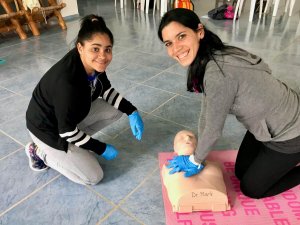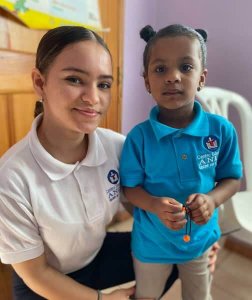While the joy of serving children and youth includes keeping a close watch on them to ensure their sustained holistic development, it also demands constant vigilance for potential threats. Coming from at-risk situations, those risks, particularly relating to their health, can quickly turn into a razor’s edge for our children.
“We have a visiting Service Team member from Seattle with a cough, fever, and a sore throat,” said the voice of one of our school directors reporting the issue via phone to Vic Trautwein, Country Co-Director of Kids Alive Dominican Republic (KA DR). Having hosted hundreds of visitors over the years to KA DR programs, and knowing how under normal circumstances travel and weather changes can be punishing, Vic might not have been too concerned. But that call was in March, and Dominican Republic had just reported its first case of COVID-19, even though at that time it had not been recognized as a pandemic-level threat in the Americas. COVID-19 still seemed distant, fuzzy, and transient.
Our forward-thinking health care team had already begun to spruce up the health care systems to ensure the protection of our 2,000 plus children and several hundred staff. But the call, like an alert from God, propelled our efforts into high gear and we switched operation into emergency mode. We urgently put into place precautionary policies and measures while fleshing out details. Hand washing and hygiene protocols went into immediate effect, followed by designated quarantine rooms and the development of educational material for all our schools. Those early decisions put us in the driver’s seat to stay ahead of the COVID-19 curve while responding to the unfolding crisis. We even got ahead of the Dominican government’s response to the epidemic! Two weeks later, the Dominican government ordered all schools closed and sealed the island from visitors.
We sealed our residential homes and quarantined all our residential children and workers on their campuses. Ever since then, our health care workers have been working diligently in various ways to protect our students, their families, and our staff from COVID-19.
These health measures paid off: all our residential kids at the time of this update are in good health. We are so grateful to God for honoring our decisions and actions.
All of this couldn’t have been possible without a robust health care team. We are blessed today to have a team that includes a pediatrician, nutritionist, five nurses, three dentists, and a medical student that help care for the over 2,000 children and youth in the 10 Kids Alive programs. But until a few years ago this was little more than a dream. “I recall a few startling events many years ago,” remembers Vic Trautwein. “A visiting dental team pulled out 114 infected teeth from the youth at one of our schools, and the family of a seven-year-old student was asked to find a guarantor for $1,000 before she could have emergency surgery for a ruptured appendix. We realized that with better organization and effort we could preemptively save not just teeth but, in some cases, lives.” Until a few years ago, better prevention, health education, good nutrition, and access to emergency care were only in the realm of possibilities, but now they are a pleasant reality for all our children.
Thanks to God and your provisions, the scope of medical services at Kids Alive Dominican Republic programs now includes:
- First Aid capacity and local clinic relationships for each site
- Regular dental care at four of seven schools with plans to add more
- Menu assistance from our nutritionist at each site along with a supplemental program for underweight children
- Assistance with chronic health conditions such as asthma and diabetes
- Capacity for vision and hearing checks for each child
- Educational material (including COVID-19 protection) for each site
- Training of more than 30 of our workers in First Aid and CPR
Our goal is for every young person to leave our program with a healthy spirit, mind, and body, having learned how to take responsibility for their own health.
An interview with Nurse Carla Carla came to Constanza with her husband and three children as refugees from Venezuela. She has been an incredible blessing to our ministry not only as a nurse but also as a friend and collaborative worker. Quick to take initiative and an eager learner, Carla has advanced health care in both the Constanza School and at the Ark Constanza home. She is a capable and reliable worker who is good at engaging all whom she serves. She has been able to develop and give training to staff and children alike. During the coronavirus pandemic, Carla has played a key role in helping develop and disseminate information about COVID-19.
Carla came to Constanza with her husband and three children as refugees from Venezuela. She has been an incredible blessing to our ministry not only as a nurse but also as a friend and collaborative worker. Quick to take initiative and an eager learner, Carla has advanced health care in both the Constanza School and at the Ark Constanza home. She is a capable and reliable worker who is good at engaging all whom she serves. She has been able to develop and give training to staff and children alike. During the coronavirus pandemic, Carla has played a key role in helping develop and disseminate information about COVID-19.
How long have you worked in health care for Kids Alive?
For almost three years, I have worked in the area of health care. I serve in the Kids Alive ministry by focusing on prevention as well as providing care for the children. I really like working in this role because I have had the opportunity to develop and grow in what I love to do.
Why is your health care work at the Ark important?
One of the most important things I do is in the area of preventing illnesses in order to avoid bigger, more complicated problems in the future (done by educating children and house parents, ensuring children get their vaccinations, and monitoring children’s vision and growth). I also check on and refill the First Aid kits in each of the residential homes to ensure they have adequate supplies and medicines. There is a document for the house parents to register all medicines given to the children in their houses which I collect and review. In this way, I ensure that parents are administering medications appropriately and can also see if any children have chronic problems that need to be addressed.
How else do you help?
I help children with acute and chronic health issues by taking them to to the doctor, making sure they get the proper follow-up, such as when a child is referred to a specialist, needs further examination or blood test, or is prescribed medicines. Serving as a liaison for the house parents, I maintain regular contact with the doctors and therapists and ensure that everyone understands the treatment plans. For example, we have one girl who has a thyroid problem and also has a slightly elevated cholesterol level. I make sure she is getting her medication and follow up on the adjustments made to her diet – decreasing her consumption of saturated fats. Her house mom is managing her case really well, giving her healthy snacks and meals. In a group chat, each house mom sends a daily message reporting on the children’s health and also any medicines they might need. This has been very helpful during the COVID-19 pandemic to maintain good communication and health care.
Click on an image below to enlarge and read captions

Nurse Felicia works compassionately to provide competent care to children, following up on those with special needs like this young boy with Type 1 diabetes getting an insulin shot. She also works closely with nutritionist Taylor to guide the kitchen staff and the boy's mother regarding an appropriate diet.

Health care workers Carla and Lisa work with nutritionist Taylor to accurately measure all Constanza School children. Taylor then calculates body mass index (BMI) to determine which children are to be included in the nutrition supplementation program. Distance learning this fall poses a daunting challenge to execute this critical program.

All children in the 10 Kids Alive sites are measured at least once per year, and more often if identified as having issues. Pediatrician Leslie Trautwein, Kids Alive DR Medical Director, works closely with health care workers at each site to care for acute illnesses as well as develop preventative care.

Nurse Mariel of Park School distributes peanut butter and vitamins to children with low BMI’s who are in the nutrition supplementation program. Nutritionist Taylor oversees these programs and, along with the health care worker, follows the children's height and weight progress closely. With schools in distance learning mode, the nurses are working on alternate plans to measure children and provide supplements to those in need.

Although most of our children receive their primary nutrition from the various Kids Alive schools, nutritionist Taylor has developed instructional tools, like this game of “My Plate,” to teach children healthy eating. With diabetes and hypertension being two common adult illnesses in Dominican Republic, it is important for kids to learn about the nutritional value of common foods here.

Nurse Carla organizes the Constanza medical “pharmacy” which is used to restock the First Aid kits in all the Ark Constanza homes. She carefully monitors the use of medications in the homes, guides the house parents, and follows children under medical treatment plans. As part of preventative care, she makes sure children's vaccinations are up to date.

Annual vision screening is often carried out with the help of visiting student ophthalmologist work teams. Here a Vanderbilt University student screens Eva M Russell and Casa Monte Plata's children. Those with sight issues are taken to a local optometrist or ophthalmologist for more complete exams and provided glasses.










